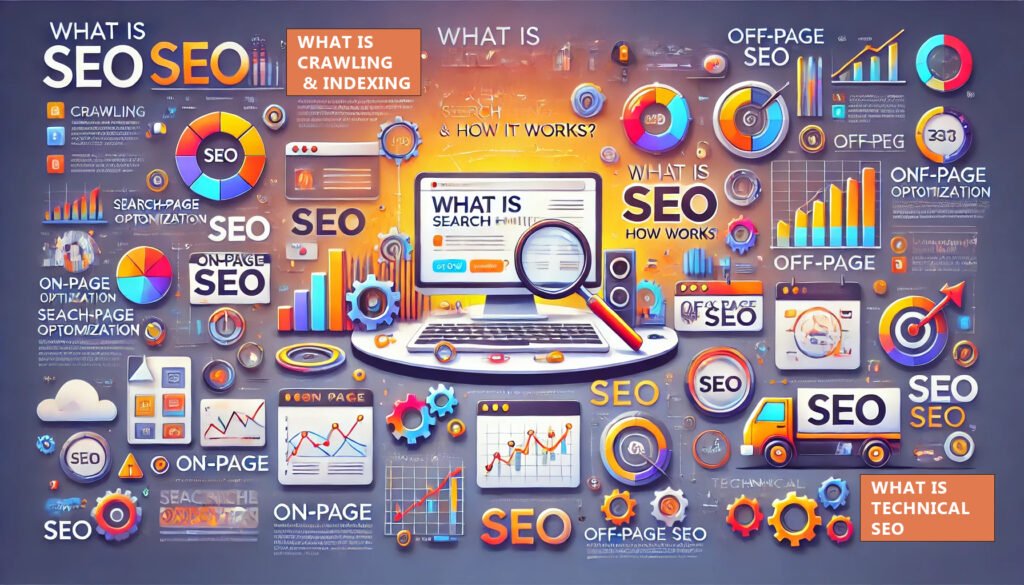What is SEO (Search Engine Optimization) and how does it work?
The full form of SEO is Search Engine Optimization and it is the process of some technical configuration that used to optimize a website’s content that increases its visibility in the Search Engines that the pages can become findable easily by user’s search queries and as a consequence, search engines can rank them better.
SEO is a part of Digital Marketing and it is a continuous process to do SEO of your site to sustain its ranking position in the Google SERP.
You know “Neither Google nor YouTube will care to rank you on the top of the search result page, but you want them to.
So, what technique should you follow?
It’s simply SEO.”

Why does your website need to do SEO?

To improve a Website’s visibility on search engines result page like Google you need to do SEO (Search Engine Optimization) of your site, which means more people can find your site organically when searched by the relevant keywords, leading it to increased website traffic, gets potential customers, and ultimately grow sales or leads of your business. Essentially, SEO helps your site to rank higher in the search results page, showing the site more easily to the potential customers to discover you online.
The Key reasons why SEO is important-
Increase Organic Traffic: By optimizing your website for search engines like Google, you are more likely to appear on the first page of search results, which helps to drive more organic traffic to your site.
Better Brand Awareness: High search engine rankings can help to improve your brand visibility and establish your company with authority in your area of business.
SEO is a Cost-Effective Marketing: By comparing to paid advertisement, SEO can be a cost-effective way to reach a large audience.
Improved User Experience (UX): Optimizing your website for SEO often involves improving the user experience by making your site comfortable to navigate and easier to understand.
Reaching Targeted Audience: By researching and inserting important relevant keywords, you can target users actively to search for key information related to your products or services.
Competitive Advantage: If your competitors are doing SEO and if you are not, you obviously fall on back foot from them in the particular field of business. Because, organic traffics will get your competitors site & information on the top page during search and will navigate to thereby simply. So, optimizing your website definitely helps you as an advantage to sustain in the business battle field always.
Very simply it can be said-
Google won’t care to rank you, but you want it.
So what technique should you follow, that’s SEO.
SEO is a keyword game, and it should be played by following some specific strategic techniques.
How Does SEO actually Work?

SEO (Search Engine Optimization) is the practice of displaying a website pages to rank higher on search engine results pages (SERPs) for specific keywords or phrases (group of words). The goal is to increase the quantity and quality of organic (unpaid) traffic to your site by pulling them by filling up their necessary information or products or services. Here’s a breakdown of how it actually works:
1. Crawling and Indexing
Crawling: Search engines like Google use Robots (spiders) to crawl websites by following links from the sitemap.xml file of the site and gather information about pages.
Indexing: The crawled data is then stored in a giant database (the index) of Google, where it can be retrieved and ranked when users search for their relevant terms.
2. On-Page SEO Factors
These refer to content on your website that you control directly:
Content Quality: High-quality, specific informative, engaging, and well-structured content with targeted and related keywords.
Keywords: Strategic placement of relevant keywords for the search terms in titles, headings, URLs and throughout the content.
Meta Tags: Titles, descriptions, and image alt tags help search engines to understand your content easily.
URL Structure: Clean and descriptive URLs that are easy to read by the Robots.txt.
User Experience (UX): Fast-loading pages, mobile-friendliness, and intuitive navigation with expected information.
3. Off-Page SEO Factors
These are external factors that influence your site’s authority from the outside of your website:
Backlinks: Links from other authoritative websites generate signal for credibility and trustworthiness. Quality matters here more than quantity.
Social Signals: Engagement on social media platforms can indirectly impact on webpage rankings.
Brand Mentions: Citations of your brand name, even without a link, can build your website’s credibility.
4. Technical SEO
These factors are involve behind-the-scenes optimizations-
Site Speed: Faster-loading pages improve user experience (UX) and rankings both.
Mobile Optimization: Websites must be responsive and work well on all types of devices.
Crawlability: Ensure search Robots can access your pages by managing robots.txt files and sitemap.xml submissions.
Structured Data: Schema markup always helps search engines to understand your content better.
5. Content Strategy
Consistent creation of specific and valuable content always attracts search traffic:
Blog posts, infographics, videos and guidelines tailored search intent of your audiences. Using of pillar content and topic clusters helps your content more specific.
6. Search Intent and User Behavior
Search engines definitely prioritize user satisfaction-
Matching of user queries with the most relevant results (informational, navigational, transactional intent) is important.
Time spending on the site, bounce rates, and click-through rates signal about how helpful your content is.
7. Algorithm Updates
Search engines continuously update their algorithms (like Google’s core updates) to provide people for better search experiences. Staying with these changes is essential.
SEO is a dynamically mix of content with proper keywords, technical optimization, and authority-building activities. The key is to focus on delivering a great user experience while helping search engines to understand your site better.
Search Engine’s robot crawls the website’s content and researches its Keywords and indexes. SEO techniques help search engines to find and display content as user’s necessity and improve its rank on search engine results pages (SERPs).
Does SEO start work immediately?

SEO does not take instant action and can’t deliver immediate results, it takes time to show measurable & significant effects.
According to the Google video tutorial, SEO generally takes 4 to 12 months to get full benefit. During this time period, SEO helps to grow your site’s visibility and do continuous improvement of your business and then you can see potential benefits. But this timeline actually depends on various factors.
Here’s why and what to expect-
Why SEO Doesn’t Work Immediately
Search Engine Crawling and Indexing: SEO effect takes time for search engines like Google to discover, crawl and index your website’s pages after completed any optimization.
Competition: You’re competitions against established websites that already have authority and backlinks in the same niche as yours.
Content Impact: Even high-quality content needs time to gain attraction and pull visitors by searching, backlinks, and social engagement.
Algorithm Evaluation: Search engines need to assess your website’s credibility and relevancy over time before ranking it higher.
SEO Timeline, though it is a Rough Estimation
1st month: Technical audits, research, strategy creation, and make foundational changes in the sear engines database.
2–3 Months: Begin seeing your websites modest improvements, especially for long-tail keywords.
4–6 Months: Make noticeable ranking improvements for competitive keywords if your work is consistent.
6–12 Months: Potential time frame for significant growth and improving competitive positioning.
Factors Affecting this Timeline
Website Age: Older domains or websites with prior traffic may see faster improvements.
Competition Level: Niche markets sometimes rank faster and competitive industries generally take longer.
Content Quality: Better and optimized content might generate quicker results.
Backlinks: High-quality and authoritative backlinks can speed up ranking growth.
If your website consistent and being strategic, SEO efforts compound over time, leading to sustained growth.
Topical authority is an important SEO concept where a website aims to become the go-to authority on one or more topics.
Building topical authority is about helping search engines like Google to understand a website’s topic easily so that it has significantly better potential to rank for topically related keywords.
Help Google to find your content
- Check if Google can see your page in the same way that a user does.
- If you don’t want a page in Google’s search results?
- Use descriptive URLs always.
- Group topically in similar pages in directories.
- Reduce duplicate content carefully.
- Expect and implement your readers’ search terms.
- Avoid distracting advertisements always.
- Link to relevant resources to get high authority.
- Influence how your site looks in the Google Search result page
- Add images to your site and optimize them, Google can read the alt tag, title & descriptions
- Optimize your videos, Google can read the tag, title & descriptions
- Promote your website to get more traffic
- Things Google believes that you shouldn’t focus on
- The next steps like get started with Search Console, Maintain your website’s SEO over time, Enhance how your site looks in Google Search results.
Stay informed and ask questions regularly
As you are embarking on your SEO journey, here are some resources that can help you to stay on the top of changes and new resources that Google publish.
Google Search Central blog: Learn the latest information from Google Search Central blog.
You can find latest information about updates to Google Search, newly added Search Console features, and much more.
What is topical authority in SEO & How does it Build?

Google Search Central on LinkedIn and or X (Twitter): Follow Google’s changes for updates on Google Search and resources to help you to make a great site.
Google Search Central Help Forum: Post questions what you want to know about your site’s SEO related issues and find tips tricks to create high quality sites from the product forum team for website owners. There are so many experienced contributors in the forum, including Product Experts and or occasionally Googlers.
Google Search Central YouTube Channel: Watch hundreds of helpful videos that created for website owners that how to get high topical authority tips.
